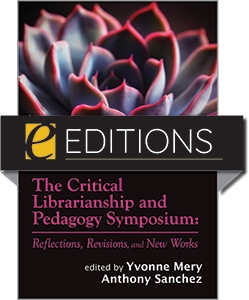
Primary tabs
You don't need to be an ALA Member to purchase from the ALA Store, but you'll be asked to create an online account/profile during the checkout to proceed. This Web Account is for both Members and non-Members.
If you are Tax-Exempt, please verify that your account is currently set up as exempt before placing your order, as our new fulfillment center will need current documentation. Learn how to verify here.
- Description
- Table of Contents
- About the authors
Academic librarianship is due for a major paradigm shift in response to the existential threats facing the library profession and higher education, and library workers are leading this shift with new ideas about community, feminism, education, and social change.
The Critical Librarianship and Pedagogy Symposium: Reflections, Revisions, and New Works collects expanded and updated presentations given at the Critical Librarianship and Pedagogy Symposium (CLAPS) held biennially at the University of Arizona Libraries. This anthology provides a toolkit for critical library pedagogy that recognizes how knowledge is created within historical and deeply politicized contexts. Authors working in library or disciplinary teaching fields explore intersections between information literacy and critical pedagogy and provide current thinking, assessment, and reflection on their practices of teaching students how to recognize and critique the oppressive power structures inherent in educational systems. The work done by librarians is analyzed to reveal the socioeconomic frameworks that drive the costs of our labor.
Divided into five parts—Critical Pedagogies in the Classroom, Feminist Library Practices, The Labor of Librarianship, Practices of Care, and Community Archives—chapters include explorations of the advent of neoliberalism in higher education, social justice, white fragility, supporting neurodivergence in education, and disability-rights activism. They use lenses such as queer, intersectional, feminist, and critical race theory to examine subjects, and include practices for sustainable teaching, facilitating dialogue in the classroom, and using tools such as user experience or empathic design. The Critical Librarianship and Pedagogy Symposium offers ways to incorporate critical pedagogy theory into your own practices as educators, both within the library and in higher education in general.
Introduction
Walking the Long Road: Transforming Library Spaces for Liberation
Yvonne Mery and Anthony Sanchez
Part I: Critical Pedagogies in the Classroom
Chapter 1
Facilitation Skills for Critical Library Instruction
Amy Gilgan
Chapter 2
Anti-ableism in Library Instruction: Considerations for Neurodivergent Students
Paige Crowl and Elizabeth C. Novosel
Chapter 3
Information Studies for Social Justice: Praxis in an Undergraduate Course
Lua Gregory and Shana Higgins
Part II: Feminist Library Practices
Chapter 4
What Is Authority? A Feminist Investigation of Personal Experience as Knowledge in Student Research and Writing
Martinique Hallerduff and Hannah Carlton
Chapter 5
Situated Data: Feminist Epistemology and Data Curation
Scout Calvert
Part III: The Labor of Librarianship
Chapter 6
Acting “As If”: Critical Pedagogy, Empowerment, and Labor
Rafia Mirza, Karen P. Nicholson and Maura Seale
Chapter 7
Beyond Sustainability and Self-Care
Veronica Arellano Douglas, Emily Deal, and Carolina Hernandez
Part IV: Practices of Care
Chapter 8
Academic Library Labor as Community Care Work
Siân Evans and Amanda Meeks
Chapter 9
A Practice of Connection: Applying Relational-Cultural Theory to Librarianship
Anastasia Chiu, Veronica Arellano Douglas, Joanna Gadsby, Alana Kumbier, and Lalitha Nataraj
Part V: Community Archives
Chapter 10
Community-Based Archives and Their Pedagogies
Jamie A. Lee, Kristen Suagee-Beauduy (Cherokee Nation), and Samantha Montes
About the Editors
About the Authors
Yvonne Mery
Yvonne Mery, Associate Librarian, leads the Instructional Design and e-Learning unit at the University of Arizona Libraries. She is also adjunct professor in the iSchool at the University of Arizona where she teaches courses in research methods and e-learning. Ms. Mery has designed and implemented online courses in information literacy skills for undergraduate students and collaborated with departments across campus to support students and instructors in their research needs. She has authored several papers and a book on the integration of information literacy in online classes and presented at numerous national conferences on best practices for online information literacy instruction. Ms. Mery has also designed and delivered workshops and courses in instructional design and tutorial development. She is the co-founder of Sidecar Learning, an e-learning platform. In addition to her MLS, she also holds an MA in Teaching English as a Second Language and a BA in English Literature. She has extensive experience working with a diverse group of undergraduate and graduate students.
Anthony Sanchez
Anthony Sanchez is an Associate Librarian and lead for the Research Incubator unit at the University of Arizona Libraries. He is also a co-founder of the CATalyst Studios multidisciplinary makerspace sponsored by UAL. Anthony has previously held academic library positions at the University of California, Riverside and throughout the Maricopa County Community College District. He holds a BA in English literature and an MA in library and information science from the University of Arizona. His research interests include peer learning models, ethical approaches to archives, and inclusive digital literacy practices.


